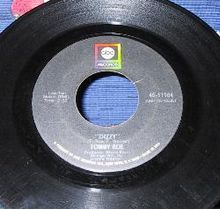- Dizzy (song)
-
"Dizzy" 
Single by Tommy Roe from the album Dizzy B-side "The You I Need" Released February 1969 Format 7" Recorded 1968 Genre Pop Length 2:52 Label ABC Records Writer(s) Tommy Roe, Freddy Weller Producer Tommy Roe Certification Gold (RIAA)[1] Tommy Roe singles chronology "Sing Along with Me"
(1967)"Dizzy"
(1969)"Heather Honey"
(1969)"Dizzy" is a song originally recorded by Tommy Roe which was a worldwide hit single in 1969.
Written by Roe and Freddy Weller, "Dizzy" was a major hit on both sides of the Atlantic, reaching number one on the U.S. Billboard Hot 100 for four weeks in March 1969, for one week on the UK Singles Chart in June 1969, and was #1 in Canada in March 1969.[2]
"Dizzy" is noted for multiple key changes. There are eleven key changes total between a total of four keys. One key is used for the verses, while the choruses get three keys. The key used for the verses is the lowest, while the choruses start off in a higher key, quickly increases to an even higher key, then increases yet again.
It was subsequently recorded by such disparate artists as Boney M, Mike Melvoin and the Deadbeats, Wreckless Eric and Billy J. Kramer
In 1991, a cover of "Dizzy" recorded by English comedian Vic Reeves and the alternative rock band The Wonder Stuff peaked at number one for two weeks in the United Kingdom in November. This adds another key change to the eleven that already exist (from F major to G major, making a total of 12.
In 1989 it was sampled by De La Soul on a remix by Chad Jackson of their track "The Magic Number" from their album Three Feet High and Rising. In 1994 it was covered by Babe on their album 4 Babe pesme; the Babe version being entitled "Dizel". A version of the song has been recorded by Bob the Builder, with the lyrics referring to Bob's concrete mixer, Dizzy. This version of the song follows the arrangement of the 1991 Vic Reeves/Wonderstuff cover, but with a more electronic percussive backing.
In 2005, "Dizzy" was used in the soundtrack of The Sandlot 2, introducing the song to a 21st Century audience.
Tommy Roe's version was also set to three Goofy cartoons in DTV Disney. These cartoons are called Fathers week-end, Fathers are people and Father's day off.
Contents
Charts
Tommy Roe version
Chart (1969) Peak
PositionAustralian ARIA Singles Chart[3] 2 Canadian Singles Chart[4] 1 German Media Control Charts[5] 4 Norwegian VG-lista Singles Charts[6] 4 UK Singles Chart[7] 1 U.S. Billboard Hot 100[8] 1 Vic Reeves version
Chart (1991) Peak
PositionUK Singles Chart 1 References
- ^ RIAA Gold and Platinum Search for singles by Tommy Roe 14 December 2008
- ^ Chart details at tsort.info
- ^ Chart information at tsort.info
- ^ Canadian Singles Charts at webfitz.com
- ^ Chart information at tsort.info
- ^ Chart information at norwegiancharts.com
- ^ Roberts, David (2006). British Hit Singles & Albums (19th ed.). London: Guinness World Records Limited. p. 467. ISBN 1-904994-10-5.
- ^ Allmusic.com - Charts & Awards
Preceded by
"Everyday People" by Sly & the Family StoneBillboard Hot 100 number-one single (Tommy Roe version)
March 15, 1969 - April 11, 1969Succeeded by
"Aquarius/Let the Sunshine In" by The 5th DimensionPreceded by
"Get Back" by The BeatlesUK number one single (Tommy Roe version)
June 4, 1969Succeeded by
"The Ballad of John and Yoko" by The BeatlesPreceded by
"The Fly" by U2UK number one single (Vic Reeves version)
9 - 16 November 1991Succeeded by
"Black or White" by Michael JacksonCategories:- 1969 singles
- 1991 singles
- UK Singles Chart number-one singles
- Billboard Hot 100 number-one singles
- Songs written by Tommy Roe
- Singles certified gold by the Recording Industry Association of America
- Songs written by Freddy Weller
Wikimedia Foundation. 2010.
